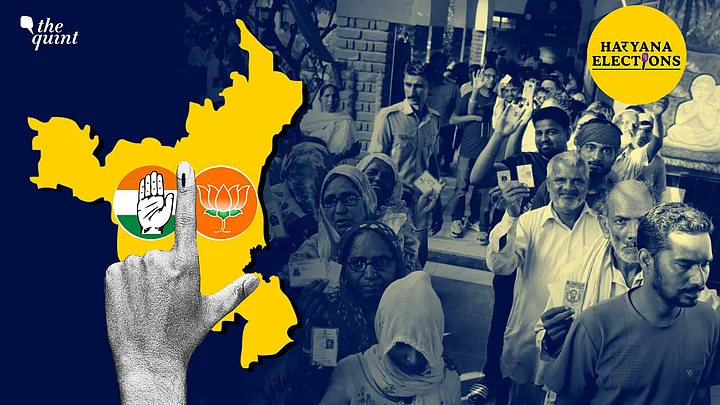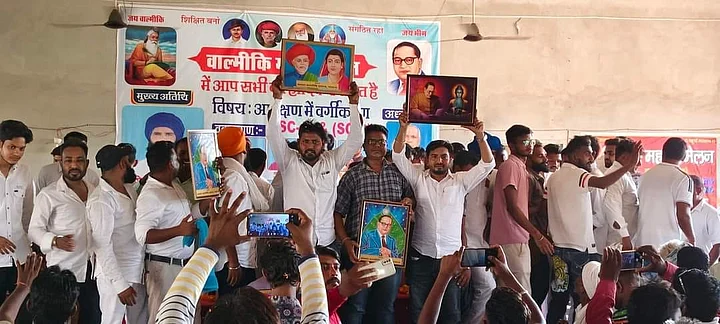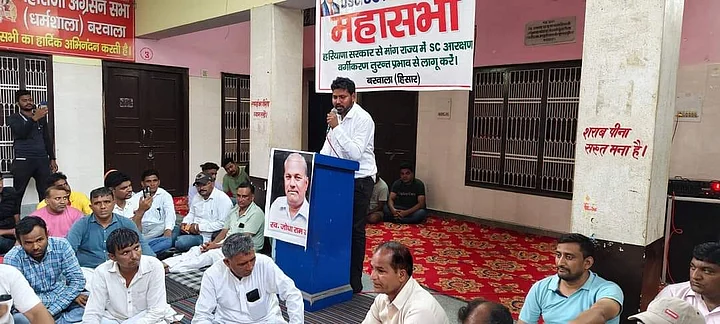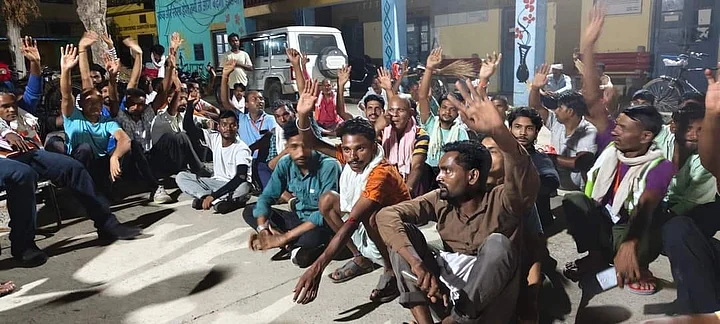“The Congress underestimated us, ignored us. So, we turned to the BJP,” said Devidas Balmiki, chief of the Deprived Scheduled Caste Sangh in Haryana.
Clues to Congress’ unexpected defeat and BJP’s surprise victory in the recently-concluded Haryana Assembly elections lie in the shift in Dalit votes. And this is because just weeks before the polling dates were announced, the Supreme Court on 1 August allowed state governments to sub-categorise Scheduled Caste (SC) communities for the purpose of reservations.
Effectively, this meant that among Dalits, castes which are underrepresented in education, jobs and politics despite their numbers increasing with time — or deprived Scheduled Castes (DSCs) — can now be entitled to quota within the quota demarcated for SCs, if a state government so wishes. The top court’s verdict invited contention, particularly from the dominant SC communities.
On the one hand, Mayawati’s Bahujan Samaj Party (BSP) and Chandrashekhar Azad’s Azad Samaj Party (ASP) took to the streets to protest the apex court’s verdict and called for a ‘Bharat Bandh’ on 21 August. On the other hand, Nayab Singh Saini’s BJP government in Haryana announced on 18 August that half of the 20 percent quota for Dalits in government jobs will now be reserved for DSCs, albeit after elections.
“But Congress chose to stay silent on the issue. It did not support either side. And this is why it lost, more than the sidelining of Kumari Selja,” said Gaurav Kumar, a Karnal-based journalist who writes on politics and caste.
In this story, we dive deep into the Dalit vote in Haryana— how and why did it split, and why did SC voters switch their vote to BJP in the Vidhan Sabha elections just four months after voting for the Congress in the Lok Sabha elections.
Why Deprived Scheduled Caste Communities in Haryana Didn't Favour Congress
“DSCs have had a long-winded antipathy to the Congress. In the current scenario, they consider Selja as their biggest enemy,” said Kamal Banbhori, a Hisar-based social activist who works with DSCs, and Denotified Nomadic and Semi-Nomadic Tribes in Haryana.
He told The Quint that the DSCs have been demanding representation since 1966, when Haryana was separated from Punjab. In 1993, then Haryana chief minister Bhajan Lal had sought a report to review the distribution of benefits among different SC communities in the state.
“In 1994, data from the Gurnam Singh Commission that 74 percent beneficiaries were those belonging to SCs engaged in leather-related work — including Chamar, Rehgar, Ramdasi, Ravidasi, Jatav, Mochi — while 26 percent beneficiaries belonged to castes such as Balmiki, Khatik, Dhanak etc.,” Kamal claimed.
Based on this data, the Bhajan Lal led Congress government bifurcated SCs into SC-A, consisting of 36 non-Chamar deprived Scheduled Castes, and SC-B, comprising Chamar and four related castes engaged in leather work. Each block was entitled to 10 percent quota in government services.
However, this notification was challenged by Gaje Singh Muwal of Chamar Mahasabha Haryana and eventually quashed by the Punjab and Haryana High Court in 2006.
“Meanwhile, in 2002, Meira Kumar recommended that those belonging to leather-related castes should write Chamar in brackets after their name. As a result, the dominant SC castes came under one umbrella; making it easier for political parties to woo them,” Kamal claimed.
In 2005, when Bhupinder Singh Hooda was Haryana's chief minister, he withdrew the sub classification of Dalit communities and combined them into one. Selja, belonging to the dominant Chamar community, was then an MP from Ambala and All India Congress Committee (AICC) member then.
“Selja’s perception as a leader among DSCs has dwindled since 2005. Her apparent sidelining by Congress this time would have had no effect on DSC votes,” Gaurav asserted.
DSC's Complain of Skewed Representation in Jobs, Politics
Scheduled Caste communities form 22.5 percent of Haryana’s population— of which 8 percent belong to Chamar-related castes, and 14.5 percent belong to DSCs. In Haryana, Denotified Tribes, such as Sapera, Bazigar, etc., also come under the purview of DSCs.
In terms of numbers, over 30 lakh people belong to Chamar-related castes, while nearly 35 lakh belong to DSCs, as per data released by Haryana State Commission for Scheduled Castes on 9 August.
“Our numbers have increased with time but our representation in jobs and politics is still skewed. 87 percent of DSCs have no access to pucca houses, while at least 30 DSCs have no access to school. Humaare liye azaadi hona ya na hona – ek he baat hai,” Kamal said.
The table below indicates how government jobs in Haryana are distributed among dominant (Chamar and related) and deprived (non-Chamar) castes. While dominant castes significantly outnumber DSCs in Group A and Group B jobs, the proportion of DSCs is higher in Group D jobs, which require less educational qualification and includes jobs like sweeper, helper, etc.
Of the 17 reserved Assembly seats in Haryana, 11 MLAs, elected this time, belong to the dominant Chamar caste, while six belong to the remaining DSCs. Even the two reserved Lok Sabha seats have MPs from the Chamar caste.
The Punjab and Haryana High Court’s 2006 decision to quash sub-classification among SCs was challenged by Sant Kabir Mahasabha Haryana and Valmiki Mahasabha Haryana in the Supreme Court.
“We have been fighting this battle for 18 years. But the Congress showed no interest during or after the Supreme Court verdict, which ultimately allowed sub-classification. The result is for everyone to see,” Devidas told The Quint.
According to a post-poll survey conducted by Lokniti-CSDS, at least 45 percent of DSCs voted for the BJP in 2024 Haryana Vidhan Sabha election. Meanwhile, the Chamar castes largely supported the Congress.
Why Did Dalit Voters Switch Sides Between LS and VS Polls?
Congress’ defeat in the Assembly elections was an unexpected one, particularly because of its stellar performance in the 2024 Lok Sabha elections, where it wrested five of the total ten seats from the BJP. These included the two seats reserved for SCs.
“During the Lok Sabha elections, at least 19 BJP candidates had claimed that they will change the Constitution, which had created unease among the Dalit communities,” Kamal claimed.
Last week, The Quint reported that Dalit voters switched from voting for the Congress in Lok Sabha elections to the BJP during Vidhan Sabha elections in at least four of the 17 reserved seats.
“During the Lok Sabha elections held in May, SC communities voted for Rahul Gandhi on the back of the ‘Samvidhan Bachao’ campaign and not for Hooda or Selja, unlike the Vidhan Sabha elections,” Gaurav argued.
In the months that transpired after the Lok Sabha election, hundreds of outreach programmes for DSC communities were held across Haryana. While Kamal said he held 2,667 public meetings and met nearly 22,000 people from the DSC communities, Devidas said he held nine ‘mahasammelan’ since April last year.
He said that each of these public meetings saw thousands participating and were held in Panipat, Kaithal, Rohtak, Hisar—with the most recent one being held on 22 September this year.
'DSCs have Given BJP the Last Lifeline'
“As the Congress disregarded us, we approached BJP leaders on several accounts. During the 2014 and 2019 Vidhan Sabha elections, BJP promised sub-classification but didn’t do much, saying the matter is sub-judice. This time, we are giving BJP the last lifeline,” Devidas said.
He added that the party “at least showed some movement favouring the DSCs” in 2020, when the Haryana Cabinet passed a bill splitting the SC quota among dominant and deprived Dalits in education.
Nayab Singh Saini is set to take oath on 17 October— coinciding with Valmiki Jayanti, which is celebrated to mark the birth anniversary of the author of Ramayana.
Devidas claimed that a government notification on the sub-classification of SCs is expected after Saini’s swearing in on Thursday.
“For the first time in 58 years, DSC communities have asserted their presence. We will celebrate Valmiki Jayanti twice this year—on 17 October, and on the day the sub-classification gets effectuated,” Devidas remarked.
(At The Quint, we question everything. Play an active role in shaping our journalism by becoming a member today.)



